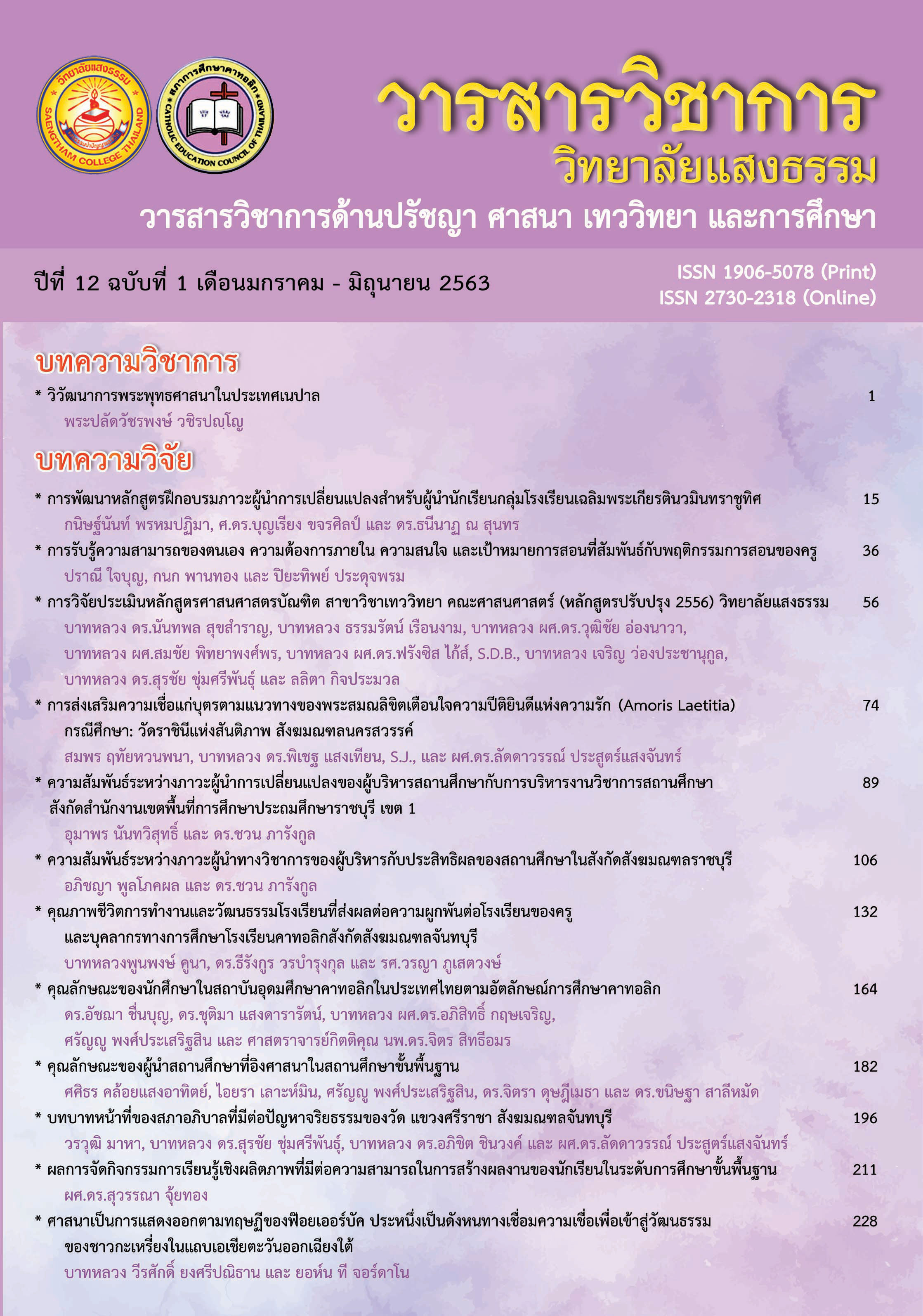The Evaluation of the Curriculum on Bachelor of Divinity Program in Theology, Faculty of Divinity. (Update B.E. 2556) Saengtham College.
Main Article Content
Abstract
The evaluation of the curriculum on Bachelor of Divinity Program in Theology, Faculty of Divinity (Update B.E. 2556), Saengtham College had the following objectives: 1) to evaluate the context, the input, the process, the production and the impact of the curriculum on Bachelor of Divinity, Program in Theology, Faculty of Divinity (Update B.E. 2556) Saengtham College. 2) to study the issues and guidelines for development and improvement of the Bachelor of Divinity, Program in Theology, Faculty of Divinity (Update B.E. 2556), Saengtham College by using CIPPI Model on the sample groups of 64 respondents. The sample of the research comprised 4 committees of Saengtham College, 13 lecturers, 12 specialists of Catechism, 23 students ranging from sophomore to senior, 9 alumni and 3 parents of the students. The research instruments consisted of interviews, questionnaires and focus group discussions. The data collected was analyzed using Per- centage (%), Means (x̅), Standard Deviation (SD) and content analysis. The results of the research were as follows: 1. The context of curriculum showed that the structure and the objectives of the curriculum, the guidelines for the development of the college received from the participants, the overall improvement and development plan for the curriculum were high. The improvement of the objectives of the course is suitable for the current condition. 2. The input factors of the curriculum found that the overall image is good. The books in the library have been updated, some of the subject descriptions have been adjusted by adding the knowledge of the ritual and the Holy Sacrament in theory and practice. 3. The process of the curriculum for knowledge management in overall were at high level. The theoretical and practical sectors should be integrated in the teaching processes so that students can apply their knowledge to daily life. Teaching and learning styles should be reviewed, the practical activities should be combined in accordance with student training program in the future. 4. The outcome of the curriculum in overall found that students have knowledge of the theology at high level. The projects and activities are helpful for training students to become religious leaders in the future. The college should keep this unique identity on hold; 5. The impact of the curriculum in overall and in each were high. Students can apply the knowledge and experience they have had in their own works and professions. Students have the interpersonal skills, leadership skills, communicative skills, and the abilities to use technology appropriately for their jobs. Students have high responsibilities for society and the ability to collaborate effectively with others and be able to convey and extend the knowledge they have got to others.
Article Details
- The academic and research articles, as well as the content and opinions expressed therein, published in Saengtham College Journal are solely the responsibility of the respective author(s).
- Articles published in Saengtham College Journal are the property of Saengtham College. Reproduction, modification, or dissemination of all or part of the content in any form without written permission from Saengtham College is prohibited.
- Articles published in Saengtham College Journal are protected under the Copyright Act.
References
จรรยา ดาสา และคณะ. (2553). การประเมินและติดตามผลหลักสูตร การศึกษามหาบัณฑิต สาขาวิทยาศาสตรศึกษา (แผน ข). มหาวิทยาลัยศรีนครินทรวิโรฒ.
ชาติชาย พงษ์ศิริ และคณะ. (2558). การประเมินหลักสูตรศิลปศาสตรบัณฑิต สาขาวิชาปรัชญาและศาสนา คณะมนุษยศาสตร์ วิทยาลัยแสงธรรม. นครปฐม.
ธิดา ทิพย์สุข. (2552). การพัฒนาผลการเรียนรู้ด้านการอ่านและการเขียนภาษาอังกฤษเพื่อการสื่อสารของนักเรียนชั้นมัธยมศึกษาปีที่ 3 ที่จัดการเรียนรู้ด้วยเทคนิค CIRC. วิทยานิพนธ์ศึกษาศาสตรมหาบัณฑิต สาขาวิชาหลักสูตรและการนิเทศ มหาวิทยาลัยศิลปากร นครปฐม.
ธำรง บัวศรี. (2531). ทฤษฎีหลักสูตร. กรุงเทพมหานคร: ธนธัชการพิมพ์ จำกัด. พิจิตรา ธงพานิช. (2557). การพัฒนาหลักสูตร ความรู้ สมถรรนะตามมาตรฐานวิชาชีพครู. พิมพ์ครั้งที่ 4. นครพนม: คณะศิลปศาสตร์และวิทยาศาสตร์ มหาวิทยาลัยนครพนม.
พัชราพร รัตนวโรภาส. (2553). สภาพและปัญหาการจัดการเรียนการสอนวิชา ENG321 ภาษาอังกฤษเพื่อการสื่อสารมวลชน สาขาวิชาภาษาอังกฤษสื่อสารธุรกิจ คณะศิลปศาสตร์. มหาวิทยาลัยศรีปทุม.
มาเรียม นิลพันธุ์. (2555). การประเมินหลักสูตรศึกษาศาสตรมหาบัณฑิต สาขาหลักสูตรและการนิเทศ. นครปฐม: มหาวิทยาลัยศิลปากร.
รุ่งทิวา จักร์กร. (2527). วิธีสอนทั่วไป. กรุงเทพมหานคร: ศึกษาศาสตร์ มหาวิทยาลัยศรีนครินทรวิโรฒ ประสานมิตร.
วิชัย วงษ์ใหญ่. (2554). การพัฒนาหลักสูตรระดับอุดมศึกษา. กรุงเทพมหานคร.
เอกชัย ชิณโคตร. (2551). การศึกษาคาทอลิก : Utopia or Reality วัฒนธรรมองค์การของโรงเรียนคาทอลิกในทศวรรษหน้า. กรุงเทพมหานคร: ปิติพานิช.


